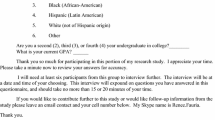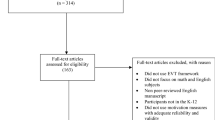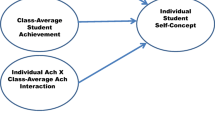Abstract
The importance of success expectancy is discussed, followed by a review of the extensive but fragmented literature demonstrating that females frequently have a lower success expectancy than males in achievement contexts, despite having a similar performance. These varied findings are synthesized and cast into a framework asserting that success expectancy emerges from three major factors: (1) the meaning given to self and the achievement situation; (2) the familiarity that one has with the task; and (3) sex-stereotypic personality disposition. This framework is then tested for 342 college students. The results show that both meaning and familiarity significantly explain success expectancy, and that familiarity also significantly explains test performance. There is no evidence, however, for a sex-related personality disposition for lower success expectancy. The discussion focuses on the need to move beyond sex differences and focus on how meaning and familiarity can impact the success expectancy of all college students.
Similar content being viewed by others
References
Bar-tal, D., and Frieze, I. H. (1977). Achievement motivation for males and females as a determinant of attributions for success and failure.Sex Roles 3(3): 301–313.
Bird, J. E. (1983). Gender differences in expectations of children when anticipated feedback and anonymity are varied.Genetic Psychology Monographs 110(2): 307–325.
Chapman, J. W., and Lawes, M. M. (1984). Consistency of causal attributions for expected and actual examination outcome: A study of the expectancy confirmation and egotism models.British Journal of Educational Psychology 54(2): 177–188.
Chronicle of Higher Education, January 27, 1988. Black students seen facing ‘new racism’ on many campuses. pp. A1, A36–A38.
Chronicle of Higher Education, March 9, 1988. Minorities' shares of college enrollments ease up ..., pp. A33–A36.
Cole, D., King, K., and Newcomb, A. (1977). Grade expectations as a function of sex, academic discipline, and sex of instructor.Psychology of Women Quarterly 1(4): 380–389.
Cooper, H. M., Burger, J. M., and Good, T. L. (1981). Gender differences in the academic locus of control beliefs of young children.Journal of Personality and Social Psychology 40(3): 562–572.
Crandall, V. C. (1969). Sex differences in expectancy of intellectual and academic reinforcement. In C. P. Smith (ed.),Achievement-Related Motives in Children pp. 11–45. New York: Russell Sage.
Deaux, K., and Farris, E. (1977). Attributing causes for one's own performance: The effects of sex, norms, and outcome.Journal of Research in Personality 11(1): 59–72.
Dweck, C. S., and Gilliard, D. (1975). Expectancy statements as determinants of reactions to failure: Sex differences in persistence and expectancy change.Journal of Personality and Social Psychology 32(6): 1077–1084.
Entwisle, D. R., and Baker, D. P. (1983). Gender and young children's expectations for performance in arithmetic.Developmental Psychology 19(2): 200–209.
Erkut, S. (1983). Exploring sex differences in expectancy, attribution, and academic achievement.Sex Roles 9(2): 217–231.
Feather, N. T. (1969). Attribution of responsibility and valence of success and failure in relation to initial confidence and perceived locus of control.Journal of Personality and Social Psychology 13(2): 129–144.
Feather, N. T., and Simon, J. G. (1971). Attribution of responsibility and valence of outcome in relation to initial confidence and success and failure of self and other.Journal of Personality and Social Psychology 18(2): 173–188.
Fox, M. F., and Hesse-Biber, S. (1984).Women at Work. Mayfield.
Frieze, I. H., Parsons, J. E., Johnson, P. B., Ruble, D. N., and Zellman, G. I. (1978).Women and Sex Roles: A Social Psychological Perspective pp. 234–254. New York: Norton.
Furst, D., Tenenbaum, G., and Weingarten, G. (1985). Test anxiety, sex, and exam type.Psychological Reports 56(2): 663–668.
Gigliotti, R. J. (1987). Are they getting what they expect?Teaching Sociology 15 (Oct.): 365–375.
Gigliotti, R. J., and Buchtel, F. S. (1988). Attributional bias and course evaluations. Unpublished manuscript, University of Akron.
Halperin, M. S., and Abrams, D. L. (1978). Sex differences in predicting final examination grades: The influence of past performance, attributions, and achievement motivation.Journal of Educational Psychology 70(5): 763–771.
Haynes, N. M., and Johnson, S. T. (1983). Self and teacher expectancy effects on academic performance of college students enrolled in an academic reinforcement program.American Educational Research Journal 20 (Winter): 511–516.
Hesse-Biber, S. (1985). Male and female students' perceptions of their academic environment and future career plans: Implications for higher education.Human Relations 38(2): 91–105.
Hill, K. T., and Dusek, J. B. (1969). Children's achievement expectations as a function of social reinforcement, sex of S, and test anxiety.Child Development 40: 547–557.
Hill, T. (1985).Efficacy expectations and technology adoption: The case of computers. Paper presented at the annual meeting of the American Psychological Association, Los Angeles, CA.
House, W. C. (1974). Actual and perceived differences in male and female expectancies and minimal goal levels as a function of competition.Journal of Personality 42: 493–509.
House, W. C., and Perney, V. (1974). Valence of expected and unexpected outcomes as a function of locus of goal and type of expectancy.Journal of Personality and Social Psychology 29(4): 454–463.
Karabenik, S. A., Sweeney, C., and Penrose, G. (1983). Preference for skill versus chance-determined activities: The influence of gender and task sex-typing.Journal of Research in Personality 17(1): 125–142.
Kimball, M. M., and Gray, V. A. (1982). Feedback and performance expectancies in an academic setting.Sex Roles 8: 999–1007.
Kramer, G. L. (1985). Why students persist in college: A categorical analysis.NACADA Journal 5 (Oct.: 1–17.
Lenney, E. (1977). Women's self-confidence in achievement setting.Psychological Bulletin 84: 1–13.
Lenney, E., Gold, J., and Browning, C. (1983). Sex differences in self-confidence: The influence of comparison to others' ability level.Sex Roles 9(9): 925–942.
McHugh, M. C., Frieze, I. H., and Hartman-Hanusa, B. (1982). Attributions and sex differences in achievement: Problems and new perspectives.Sex Roles 8(4): 467–479.
McMahan, I. D. (1982). Expectancy of success on sex-linked tasks.Sex Roles 8: 949–958.
Montanelli, D. S., and Hill, K. (1969). Children's achievement expectations and performance as a function of two consecutive reinforcement experiences, sex of subject, and sex of experimenter.Journal of Personality and Social Psychology 13: 115–128.
Nicholls, J. G. (1975). Causal attributions and other achievement-related cognitions: Effects of task outcome, attainment value, and sex.Journal of Personality and Social Psychology 31(3): 379–389.
Rosenberg, M. (1981). The self-concept: Social product and social force. In Morris Rosenberg and Ralph Turner (eds.),Social Psychology: Sociological Perspectives pp. 593–624. New York: Basic Books.
Simon, J. G., and Feather, N. T. (1973). Causal attribution for success and failure at university examinations.Journal of Educational Psychology 64(1): 46–56.
Stupka, E. H. (1986).Student persistence and achievement: An evaluation of the effects of an extended orientation course. Unpublished report, Sacramento City College.
Teglasi, H. (1977). Influence of situational factors on causal attributions of college females.Psychological Reports 41(2): 495–502.
Vermi, R. K., and Ghadially, R. (1985). Effect of mother's sex-role attitudes on need for achievement and expectancy for success in children.Psychological Studies 30(1): 1–4.
Vollmer, F. (1975). Sex differences in expectancy of examination results.Scandinavian Journal of Psychology 16(2): 152–155.
Vollmer, F. (1976). Determinants of expectancy of examination results.Scandinavian Journal of Psychology 17(3): 238–245.
Vollmer, F. (1984). Sex differences in personality and expectancy.Sex Roles 11(11/12): 1121–1139.
Vollmer, F. (1986). The relation between expectancy and academic achievement—How can it be explained?British Journal of Educational Psychology 56:(1): 64–74.
Weiner, B. (1985). An attributional theory of achievement motivation and emotion.Psychological Review 92(4): 548–573.
Zuckerman, D. M. (1985). Confidence and aspirations: Self-esteem and self-concepts as predictors of students' life goals.Journal of Personality 53(4): S43-S60.
Author information
Authors and Affiliations
Rights and permissions
About this article
Cite this article
Gigliotti, R.J., Secrest, S.E. Academic success expectancy: The interplay of gender, situation, and meaning. Res High Educ 29, 281–297 (1988). https://doi.org/10.1007/BF00992772
Received:
Issue Date:
DOI: https://doi.org/10.1007/BF00992772




